Region experts explain what diversity, equity and inclusion mean to companies and their employees
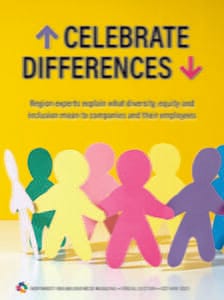
“Diversity,” “equity” and “inclusion” are more than buzz words. They hold the key to building strong, successful and sustainable organizations.
“Groups who look and think the same easily fall into tunnel vision,” said Jay Lewis, partner at THK Law LLP. “Having a diverse group around the table helps us find more creative and interesting solutions to our clients’ problems.”
In an increasingly interconnected and diverse world, the concepts of diversity, equity and inclusion have become a central focus in the national business landscape. Companies in Northwest Indiana are no different. Many businesses across the Region are working to cultivate a more inclusive workplace culture.
“In our Region I do see a change,” said Dr. Vanessa Allen-McCloud, president and CEO of the Urban League of Northwest Indiana. “We really strive to work together, to do more and to be more inclusive. Increasing numbers of leaders in organizations are reaching out to us. They are calling to say, ‘We want to do better. Can we just start the conversation? It’s time for us to talk about this.’”
The trio of diversity, equity and inclusion are often grouped together and referred to as DEI. Justice and belonging are also integral components. The concepts behind the five words — diversity, equity, inclusion, justice and belonging — are similar but distinct. Each is like a thread in a fabric, creating something stronger when woven together.
Breaking down each concept can help small businesses learn more about diversifying their workplaces.
The “D” in DEI refers to diversity — the mosaic of differences that individuals bring to the table.

Diversity is sometimes misunderstood to be solely about race.
“The concept encompasses so much more,” said Neil Samahon, president and CEO of Opportunity Enterprises Inc. in Valparaiso. “Race and ethnicity are certainly an important component, so is gender identity, sexual orientation, age, religion and socioeconomic status, as well as national origin. Our focus here at Opportunity Enterprises is disability, both visible and invisible disabilities.”
A diverse workforce brings an array of perspectives, experiences and talents. According to studies by McKinsey & Company and Deloitte, diverse companies are 35% more likely to outperform their competitors. The study found that diversity in thought can enhance team innovation by up to 20%.
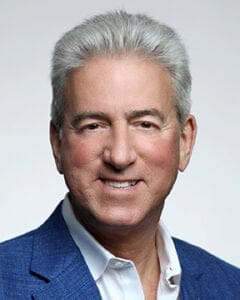
“When I look at diversity, I think about the value that brings,” Samahon said. “In the workplace, we all look to hire people who can add value. It can certainly be found in the perspectives that people of varying backgrounds bring to the job.”
Robert Kopka, founding partner of Kopka Pinkus Dolin that has a location in Crown Point, has played a strategic role in the company’s DEI work. The firm is RING (Recognizing Inclusion for the Next Generation) certified and a member of the Minority Corporate Counsel Association.
“Diversifying helps us better understand the world around us, bringing in new and unique perspectives,” Kopka said. “It also helps us represent our clients better.”
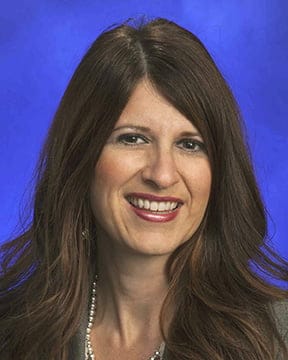
Centier Bank in Merrillville is another company putting diversity at the forefront.
“We started with establishing our mission statement: ‘To create an inclusive culture where all forms of diversity are seen as real, equal value for the bank,’” said Michelle Maravilla, senior vice president of human resources.
In 2021, the Urban League of Northwest Indiana presented Centier Bank with a Workplace Diversity Award. Maravilla is part of the bank’s diversity, equity and inclusion council. The council was founded in 2020 to represent different marginalized groups and to effect change within the organization.
“Diversity really is a general awareness of our differences and celebrating them to the point where we’re creating a better, stronger community in the workplace and where we live,” Maravilla said.
Equity, represented by the “E,” means providing equal opportunities and resources to all individuals, regardless of their background or identity.

“Equity involves acknowledging and eliminating historic and current phenomena that disadvantage some people and benefit others,” said Colette Morrow, professor of English and director of women’s, gender and sexuality studies at Purdue University Northwest.
Companies often work toward equity by addressing pay disparities and offering mentorship and development programs. This work aims to ensure that everyone has the same opportunities and is treated the same.
“Equity is ensuring there’s a level playing field, that everyone has equal access to resources,” said Geri Aglipay, a regional administrator for the U.S. Small Business Administration.
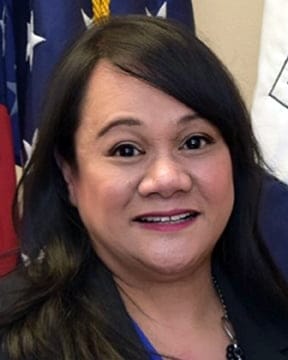
Aglipay oversees the Great Lakes region, which stretches from Minnesota to Ohio. The administration’s mission is to help American entrepreneurs
start and grow new businesses. Supporting entrepreneurs, especially those in socially and economically disadvantaged communities, helps to promote equity.
“Equity is, unfortunately, not always equality. It’s hard to have equality without fairness,” Maravilla said. “If we can help those who are marginalized have the same opportunities as those who are not, then I think we are getting closer to equity and only then can we ensure equality.”
The “I” in DEI stands for inclusion — the act of creating an environment where all employees feel valued, respected and empowered to contribute their unique perspectives.
“Inclusion is important because an organization or group can be diverse while lacking a climate of respect,” Morrow said. “Without an inclusive, respectful organizational culture, some members are prevented from participating and achieving according to their full potential. In an inclusive environment, everyone is valued and trusted, and all feel safe being authentic.”
An inclusive workplace promotes collaboration, engagement and overall employee well-being.
“One key to inclusion is giving people a voice, a chance for their thoughts and opinions to be heard and given equal weight with others,” Lewis said. “It’s important to provide opportunity and encouragement so that ideas and opinions from underrepresented voices are heard and taken seriously.”
Samahon succinctly sums up the concept of inclusion. “Individuals with disabilities don’t simply want to be accepted as they are, they want to be included as they are,” he said.
While not included in the traditional DEI acronym, “justice” is sometimes added to create DEIJ. Justice emphasizes the need to address historical and systemic inequities and to actively work toward a fair and just society.

“When it comes to justice, it is and should be, about fair (equitable) treatment across the board,” Samahon said. “Include all communities, sometimes that’s based on location, other times it can be a community of individuals with similar needs or challenges.”
Many companies, like THK Law, view DEI work as a learning process.
“It’s about looking at internal policies and processes — even traditions — that might be holding back DEI progress,” Lewis said. “There is no one initiative or training that will result in a more diverse and inclusive organization. You must be patient, strategic and open to things being done a little differently.”
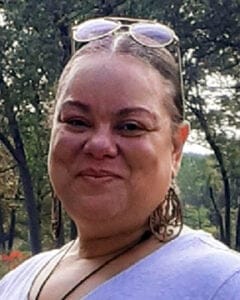
In 2022, Lewis’s firm met off-site at the Civil Rights Heritage Center in South Bend for a morning training session. This year, they will meet at La Casa De Amistad, a Latino community center.
Conversations involving DEI and justice can be difficult, said Kimmie Gordon, founder and executive director of Brown Faces Green Spaces, an environmental justice organization in Gary.
“It’s up to people being open-minded enough. It takes time; it doesn’t happen overnight. These conversations are uncomfortable but very necessary,” Gordon said. “You have to create a safe and welcoming place for these conversations to take place. In my experience, being open, direct and honest in these conversations has proved to be most productive. Tiptoeing around the subject is not the answer.”
Some versions of the acronym include “belonging,” leading to the acronym DEIJB.
“Belonging involves developing a welcoming culture that supports everyone’s success,” Morrow said. “It also entails creating a sense of community in which all members feel connected.”
Belonging focuses on creating an environment where individuals feel like they are an integral part of the organization and are valued for what they bring to the table.
“When an associate feels fully accepted, valued and empowered to be their authentic selves, it breeds connectedness throughout the organization, the community and the world at large,” Maravilla said. “It goes beyond being present in the workplace; it’s about feeling aligned with the organization’s values, culture and mission.”
She said this type of thinking helps develop better relationships with the bank’s associates and clients.
“When employees have a sense of belonging, they are more likely to engage, contribute meaningfully and thrive in their roles,” she said.
Kopka Pinkus Dolin promotes belonging in several ways, Kopka said. The firm has committees that work on recruitment, mentoring, programming and events. They also have affinity groups, which are groups of people who share a common underrepresented characteristic, such as race, sexual orientation or gender.
“The committees provide educational opportunities and awareness, and events to not only entertain but celebrate our uniqueness,” Kopka said. “We celebrate each other through our internal newsletter, in-person social events, roundtable discussions, and external events like our annual Juneteenth presentation and involvement in the Pride parade.”
Implementing DEI
“Everyone wants to diversify now, but oftentimes they don’t exactly know where to start,” Gordon said.
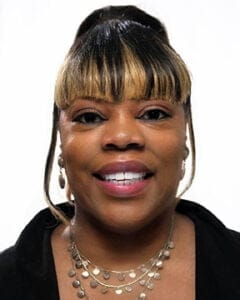
Allen-McCloud suggests conducting an anonymous survey as a first step. A survey can help establish the topics of interest to employees, such as stereotypes or LGBTQ+ issues. It can also determine if there have been any incidents, such as microaggressions — subtle, everyday interactions that communicate bias toward a group.
“A survey is like taking a temperature reading of their organization,” Allen-McCloud said.
The Urban League of Northwest Indiana works with multiple organizations in Lake, Porter and La Porte counties to provide diversity training. They help organizations looking to implement DEI initiatives and organizations looking to strengthen and expand their current DEI efforts.
“It’s not one training session and done to check off a mark,” Allen-McCloud said.
Brown Faces Green Spaces also works with organizations in the Region to strengthen their DEI initiatives.
“I partner with other local environmental organizations like Save the Dunes and the Shirley Heinze Land Trust to help them understand the dynamics of reaching a more diverse audience,” Gordon said. “I share my knowledge and skill to help them incorporate culture not just color.”
An organization providing DEI training can help facilitate what Allen-McCloud calls “courageous conversations.”
“You have to get down and do the gritty work of considering how to truly create equity, justice and belonging in your organization,” Gordon said. “It’s more than just hiring diverse people.”
Leading change
Workplace diversity initiatives focus on multiple aspects: organizational policies and practices, training and organizational culture.
Addressing policies may include examining hiring practices, pay inequities and poor employee retention among marginalized groups. Training and workshops can encourage people to be more mindful of discrimination on a personal level.
“Creating a welcoming environment for all persons starts with looking deep within the roots of the organizational structure at the mission and purpose statements,” Gordon said. “It’s about getting in touch with the internal operations of an organization to make decisions about equity that truly count. You need to truly look at the structure of an organization from the inside out, not just from the outside in.”
Another important aspect is leadership commitment. When company leaders show a dedication to DEI principles, it sets the tone for the entire organization. In many businesses across the Region, DEI efforts have started at top levels of management and worked their way down to employees. Kopka Pinkus Dolin is just one example.
“We are proud that our DEI initiatives and policies are supported from the top-down,” Kopka said. “Our core values and firm culture are emphasized during the interviewing process and shown through our comradery and supported by each individual at the firm.”
Educating employees
According to the Pew Research Center, as of May 2023, the majority of employed U.S. adults say focusing on DEI at work is beneficial.
Surveyed employees report that DEI-related policies and resources have had a positive impact at their workplace. However, only 4 in 10 employees participated in DEI training in the last year.
Workplace training and workshops can increase awareness about inclusive communication, implicit (or unconscious) bias and cultural competence. The American Psychological Association defines implicit bias as “a negative attitude of which one is not consciously aware, against a specific social group.” Cultural competence is a person’s ability to understand and respect values, attitudes and beliefs that differ across cultures.
Companies in the Region are forging the way by providing ongoing DEI education to employees at all levels.
“Centier has a 21-day challenge for teams and managers who have this as a resource to work through and build teams together,” Maravilla said. “We have unconscious bias training. I love this class because I think it’s eye opening to learn about where bias lies in all of us and how it can impact decisions and it can impact the organization as a whole.”
Diverse hiring
According to the U.S. Small Business Administration, small businesses generate two of every three jobs in the nation. Approximately 99% of Indiana businesses are small businesses. They employ 1.2 million Hoosiers.

Small businesses can make a big difference. Many companies in the Region are implementing more inclusive hiring practices that focus on attracting diverse candidates. They are rewriting job postings and rethinking traditional methods of interviewing candidates.
“It is vital that all job postings provide equal opportunities to all candidates, regardless of disabilities, and use inclusive language in job descriptions,” Samahon said. “All job postings and the application and interview process need to be accessible for all people, including those with varying disabilities.”
Although Samahon’s organization looks through the lens of hiring individuals with disabilities, such inclusive efforts apply to all historically underrepresented groups of individuals.
“We are seeing leadership within organizations that promote a culture of diversity and inclusion throughout the business,” Samahon said. “There has been a more robust shift with out-of-the-box thinking in the area of accessibility in the workplace (workspace), job sharing and flexibility within the work environment to accommodate the varying needs of individuals.”
Other companies in the Region are working with minority and student organizations to provide apprenticeships.
“At Kopka Pinkus Dolin, we started our legal apprentice program in 2020 in an effort to create a pipeline of diverse talent,” Kopka said. “Today, three years later, our first legal apprentice is a first-year lawyer, and three legal apprentices are awaiting their bar results and plan to join us as attorneys. We are thrilled to be welcoming additional legal apprentices to the firm this fall.”
THK Law also sees the need for diversity in the legal profession. However, Lewis is encouraged by the strides he has noticed in Northwest Indiana.
“For the legal profession, race is an important place to start, given the historically low percentage of Black and Latino attorneys in Indiana law firms,” Lewis said. “It’s encouraging to see more diversity in the legal profession, particularly in the leadership ranks as partners and as judges.”
A company’s approach and philosophy can be vital to diverse hiring and retaining individuals in the long term.
“Companies we work with see the value the individuals with disabilities, or I think what is more appropriate to say is different abilities, add to their organizations,” Samahon said. “A win is when employers realize that hiring someone with a disability is not an act of philanthropy but a decision to add value through the individual’s diversity.”
DEI matters
Research shows that workplace DEI efforts have social and financial advantages. Organizations are finding that when individuals from diverse backgrounds collaborate, their varied perspectives can lead to more innovative ideas and solutions.
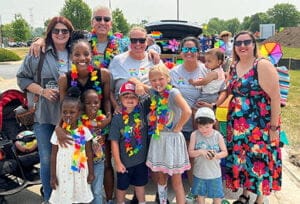
Business owners also have seen that diversity of thought translates into better decision-making. Companies prioritizing DEI have found that they are better equipped to anticipate the needs and preferences of a diverse customer base.
Organizations with DEI initiatives are more likely to attract a diverse pool of candidates and retain employees who feel valued and included. According to a LinkedIn study, 76% of employees and job seekers said company diversity was an important factor when considering employment offers. In a competitive job market, top talent often seeks workplaces that align with their values.
“It can add value to a company’s brand,” Samahon said. “It can attract a workforce that values inclusivity — something we’re finding in the younger individuals as they enter the workforce.”
Consumers are also increasingly drawn to companies that reflect their values. Organizations that embody DEI principles demonstrate a commitment to social responsibility, which can positively impact brand perception and customer loyalty.
A Harvard Business Review study found that diverse companies were 70% likelier to expand to a new market audience.
Building relationships
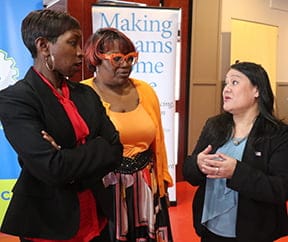
Small Business Administration, and Gary entrepreneurs Shelice Tolbert and Jocelyn Kelly talk about the impact entrepreneurship has on communities. (Provided by Geri Aglipay)
To Aglipay, who has more than 20 years of experience in entrepreneurship and economic development, small businesses tend to think differently about employees.
“Small businesses like to think of employees as family,” she said.
Many companies focusing on DEI report that the workshops and conversations have shaped them into a more cohesive team and brightened their workplace culture.
“Having the ability to make work a place to have these conversations and bring associates together creates a stronger sense of family,” Maravilla said. “Our DE&I efforts have paved the way for vulnerability and storytelling to strengthen our associates and our pillar of friendship as part of our company’s core values.”
Companies in the Region say that DEI initiatives have helped foster better relationships with each other and in the community.
“Deep down inside, we want to work harder to build relationships, not work in silos,” Allen-McCloud said. “When you see me, what you see is just 10%. We need to get to the 90%. It’s like an iceberg, there’s so much more under the waterline.”
Organizations that champion DEI are unlocking potential within their walls and in their communities.
“What would I say to another organization who wanted to implement DEI in their workplace culture?” Maravilla said. “Somebody just needs to start the conversation. That’s all it takes. Start the conversation.”
Read more stories from the current issue of Northwest Indiana Business Magazine.

